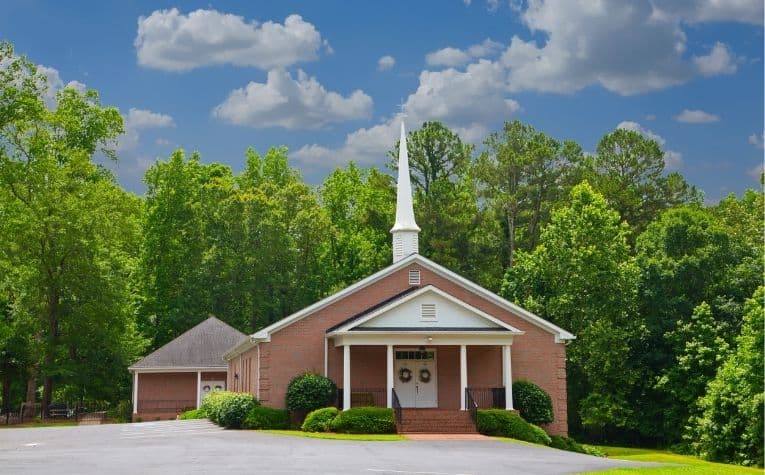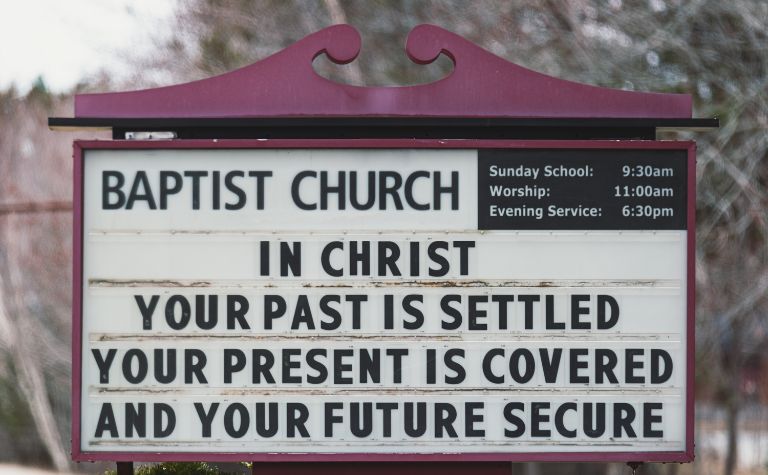The Baptist tradition, like other branches of the Christian faith, has a variety of expressions. The different names of denominations and churches within the tradition reflect this. Understanding various church names can be enlightening for those inside and outside the Baptist tradition.
The difference between First Baptist and Second Baptist churches isn’t theological but chronological. Both kinds of churches subscribe to Baptist doctrine and practice, but each was established at different times. First Baptist churches were established in a particular location prior to Second Baptist churches.
Comparing First Baptist churches to Second Baptist churches is more about learning history than theology. Nevertheless, in certain locations, sociological reasons may have spurred the establishment of an alternative Baptist church to the first one planted. Keep reading to learn more.
Also, see Baptist vs. Presbyterian: What’s the Difference? to learn more.

First Baptist Vs. Second Baptist: Is There A Difference?
The description of “First” and “Second” in the name of some Baptist churches don’t reflect their value or significance within a community.
“Second” Baptist churches aren’t inferior to “First” Baptist churches, and “First” Baptist churches aren’t more important than “Second” Baptist churches. (Also, see Southern Baptist vs. Baptist: What’s the Difference?)
The labels “First” and “Second” aren’t unique to Baptist churches either. Many Protestant denominations have used ordinal numbers (i.e., “first,” “second,” even “third”) in their names.
There are First and Second Methodist Churches, First and Second Presbyterians Churches, and First and Second Assemblies of God churches. (Also, see Baptist vs. Catholic: What’s the Difference?)
Which Baptist Church Was Established Before the Other?
The numeric designations of “first” and “second” have been used not only for churches but for businesses as well. Just as there can be a “First Federal Bank,” there can also be a “Second Federal Bank.” Other institutions and organizations can be similarly named.
Naming churches and businesses in this way commonly occurred when towns and cities were established in the past.
The first people to arrive and establish a particular institution, whether it be a bank or a church, adopted the name “First” as a label of historical significance.
History has always valued firsts. Often, the explorer to discover a river, canyon, or even continent holds a special place in the chronicles of that region.
A businessman or woman may name their company using their last name, so people will always know who established it. (Also, see What Bible Translation Do Baptists Read?)
A business may be named after its founder, just like Henry Ford founded the Ford Motor Company, but it’s not conventional to name churches after people. The only exception to this is the tradition of naming churches after one of Jesus’ Apostles or another important New Testament figure.
Names like “St. Andrews Chapel,” “St. Thomas Episcopal Church,” “St. John’s Catholic Church,” and “The Virgin Mary Lutheran Church” can be found in Catholic, Protestant, and Eastern Orthodox traditions.
However, naming churches after New Testament figures is less common in the Baptist tradition. (Also see Can a Baptist Be a Godparent?)

Do First and Second Baptist Churches Have Different Beliefs?
A particular First and Second Baptist church may have some theological differences, but those disagreements are reflected in the terms “first” and “second.”
A “First Baptist” church may be Southern Baptist, Conservative Baptist, or American Baptist. Likewise, a “Second Baptist” church may associate with any Baptist denomination. (Also, see What Does First Baptist Mean?)
The numeric terms may, in some cases, be the result of competition between Baptist denominations. For example, a church that belongs to the Southern Baptist Convention may have wanted the designation “first,” in part, to express its success to Northern Baptist churches.
Though it wasn’t the norm, it’s possible that in some towns, a Baptist church split due to theological or practical reasons, which resulted in the creation of a “Second Baptist” church.
In most cases of a church split, the newly established congregation would choose a name that disassociated them from the original church.
In some cases, a new Baptist church planted in a town showed respect to the first-established Baptist church by calling itself the “Second Baptist” church. (Also, see Do Baptists Believe in Angels?)
Some First Baptist churches experience church growth to the extent of needing to plant another congregation in the city to accommodate more people. In these cases, the new church is sometimes called the “Second” or sometimes even the “Third” Baptist church.
First vs. Second Baptist: Division Linked To Slavery And Race
In the years leading up to the American Civil War, many Christian denominations experienced dissension, and churches split over racial tensions, especially slavery.
Sadly, many stories of denominations and church communities separated due to racism and segregation. (Also see Do Baptists Believe in Original Sin?)
Some First Baptist and Second Baptist churches today reflect the divisions that existed centuries ago. Some First Baptist churches are mostly white, and some Second Baptist churches are mostly African-American.
While members of these congregations don’t necessarily share the same views as people centuries ago, the church’s racial diversity is lacking due to historical reasons.
In many cases, this was also a result of the demographics of different parts of cities and towns that were racially segregated.
There have been times when church splits within First Baptist churches, occurred over discrimination and mistreatment of African-American church members.
In these cases, African-American members would leave the First Baptist Church and establish the Second Baptist Church in that town. There have been towns and cities with more than four numerically named Baptist churches in the area.
During times of racial tensions and segregation, there have been Baptists who were for slavery and segregation and Baptists who stood against it. (Also see Do Baptists Believe in the Saints?)
The Baptist churches of predominantly African-American members played a vital role in the Civil Rights movement under Dr. Martin Luther King, who was himself a Baptist pastor.
First vs. Second Baptist: Division Linked To Differences In Beliefs
Multiple conventions and denominations within the Baptist movement have planted church communities in the same cities and regions.
This often results in multiple congregations named “First” Baptist churches, and it also results in the numerical continuation of church names such as “Second,” “Third,” and even “Fourth” Baptist churches in a city or region.
Theological debates around topics such as Calvinism vs. Arminianism have been long-standing issues of separation within Baptist denominations. (Also, see This Is What Baptists Believe About Salvation)
Some differences and divisions have occurred between traditional services versus contemporary services.
Some Baptists hold fast to the traditional expressions of their faith and the functions of their church.
In contrast, others adapt to a more contemporary expression with new additions to how they worship and facilitate services.
Traditional churches might have choirs and pews, while contemporary or modern churches will have teams of musicians leading their worship and modern chairs and pulpits in their halls.
If there are differences between certain First and Second Baptist churches, most of those differences are secondary and revolve mostly around how they practice their beliefs rather than differences in what they believe.

First Baptist And Second Baptist: Shared Baptist Beliefs
Baptists believe in the supreme authority of the Bible in all aspects of faith and their practice.
Baptists believe in a water baptism that requires full immersion into the water for every believer. This is a primary belief that has set them apart from other denominations.
Baptist churches consist of believers who have made a commitment to God and the local assembly of believers.
Baptists believe in the equality of all Christians when deciding on the affairs of the church, and local pastors are ordained by mutual agreement in the church.
Baptists believe in association with the denomination by choice and not by obligation or force. Every church is independent in its decision to belong.
Baptists believe in the separation between church and state. Churches should be independent of government interference.
Baptists believe in The Lord’s Supper as a symbolic act of obedience and have a strong belief in evangelism and missionary work. (Also see Can a Methodist Take Communion in a Baptist Church?)
Most First and Second Baptist churches believe according to the same fundamental values of the Bible and live by the same belief system and moral code.
Summary
First Baptist and Second Baptist churches are most named after the order of founding in a city or region rather than because of theological or other differences.
However, there are some cases in which differences in belief, expression, and preference have divided First and Second Baptists.
Despite the many sub-denominations, conventions, and movements within the Baptist denomination, it remains a successful denomination worldwide to this day.
Please see the related articles below.
References:
[1] Source
[2] Source
[3] Source
[4] Source
Related Questions
The Baptist tradition is one of the largest branches of Christianity in America and around the world. Historically, some Protestant denominations have prohibited their members from activities like...
Baptist denominations and churches, which date to the 17th century, comprise one of the largest branches of Christianity in the Western world. While Christian churches in Baptist networks and...
